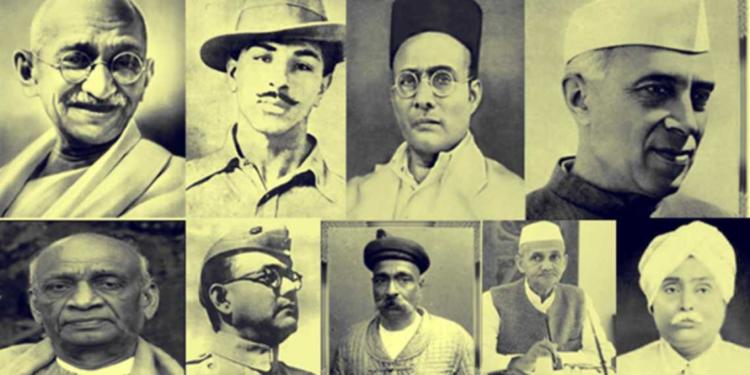A freedom fighter, nationalist, thinker, author and poet, Swatantra Veer Savarkar is truly a source of inspiration for crores of Indians. As the nation remembers this great patriot on his birth anniversary, his ideals and thoughts still guide our nation towards the progress and prosperity once envisioned by the Veer Savarkar and likes of great men. Veer Savarkar (28 May 1883 – 26 February 1966) occupies a unique spot in India’s long and illustrious history, where great ideas by great men have created waves which have a civilizational impact. A born leader, even as a kid Veer Savarkar would gather a bunch of boys and be the leader of the Vanarsena. A thrill for adventure would lead him to spend long hours swimming, trekking, hiking and conducting tours in and around his hometown of Nasik.
Veer Savarkar, who later on grew to be one of the greatest freedom fighters against the British imperialism, he had envisioned the idea of complete freedom and liberation from the chains of British slavery. Advocating the use of arms and force to achieve the mentioned cause like other great revolutionary leaders like Netaji Subhas Chandra Bose, Bhagat Singh and others, he was thus known to differ with Gandhi on the policy of India’s struggle for freedom. A leading revolutionary himself, he was attracted and inspired by the burning zeal, the heroism, bravery, suffering and tragic fate of the leaders of 1857, and he decided to re-interpret the story and to relate it in full with the help of all the material available to him at the time. He spent days and months at the India Office Library studying the period.
After facing resistance for long, finally, his work on the revolt of 1857 was published in Holland in 1909, under the title “The Indian War of Independence –1857”. The second edition of this book was published by Lala Hardayal on behalf of the Gadar Party in America, the third edition was published by Sardar Bhagat Singh, while the fourth edition was published by Netaji Subhas Chandra Bose in the Far East. This book was translated into Urdu, Hindi, Punjabi and Tamil.
A proponent of Hindutva (Hinduness), Veer Savarkar also contributed greatly to bring in an ideological revolution within the Hindu society which had been pushed by British imperialists on the back burner.
“No one should ever think that a certain Hindu caste is high or that another is low. The notion of high and low will be determined by overt merit of individuals.”
There is a tale here that is worth mentioning, when British police arrested Savarkar for anti-British activities at London’s Victoria Railway Station, as soon as his train reached there from Paris, they sent him back to India by ship in order to prosecute him. The vessel ‘Morea’ reached the French port of Marseilles on July 7, 1910. Next morning, between 6 and 7 a.m., Vinayak Damodar Savarkar escaped through a porthole and swam ashore. According to the British police, a French marine brigadier arrested the revolutionary and handed him over. Three people from the vessel helped him in the recapture.
A formal trial began which ended with Vinayak Damodar Savarkar being charged with serious offenses of illegal transportation of weapons, provocative speeches of jail and deported to the Andaman cellular jail(Kalapani).
Thankfully in 1920, many prominent freedom fighters including Vithalbhai Patel, Mahatma Gandhi and Bal Gangadhar Tilak demanded the release of Vinayak Damodar Savarkar. As a consequence of this on May 2, 1921, Savarkar was moved to Ratnagiri jail, and from there to the Yeravada jail. In Ratnagiri jail Vinayak Damodar Savarkar wrote his famous book ‘Hindutva’.
“Building separate and exclusive new temples for untouchables is not the right way of eradicating untouchability…What to speak of temples, having separate schools for untouchables is also, in a sense harmful…The liberation of untouchables is not theirs alone, it is also the liberation of those touchables whose hands and minds had been soiled by this injustice.It is desirable in the extreme to build pan-Hindu temples that are freely open to all Hindus irrespective of their caste rather than build separate and exclusive temples for untouchables…While it is important to build new pan -Hindu temples, it is equally important to throw open old temples to all Hindus.” (1929, Samagra Savarkar vangmaya, Vol.3, p.491-493)
Being a staunch supporter of the Hindu values, Veer Savarkar later joined Tilak’s Swaraj Party and founded the Hindu Mahasabha as a separate political party.
The Hindu Mahasabha opposed the creation of Pakistan, and as expected opposed Gandhi’s continued Muslim appeasement stances. Nathuram Godse, a volunteer of the Hindu Mahasabha, assassinated Gandhi in 1948 and upheld his actions till his hanging. Vinayak Damodar Savarkar was arrested and indicted by the Government of India in the Mahatma Gandhi assassination case. But he was acquitted by the Supreme Court of India. Veer Savarkar died on February 26, 1966, at the age of 83.
Veer Savarkar will always be remembered by this grateful nation as a patriot who led the country through troubled times, and as a champion of true democracy. He united the Hindus under one flag and gave them an ideology that should inspire and guide them for generations to come.




























